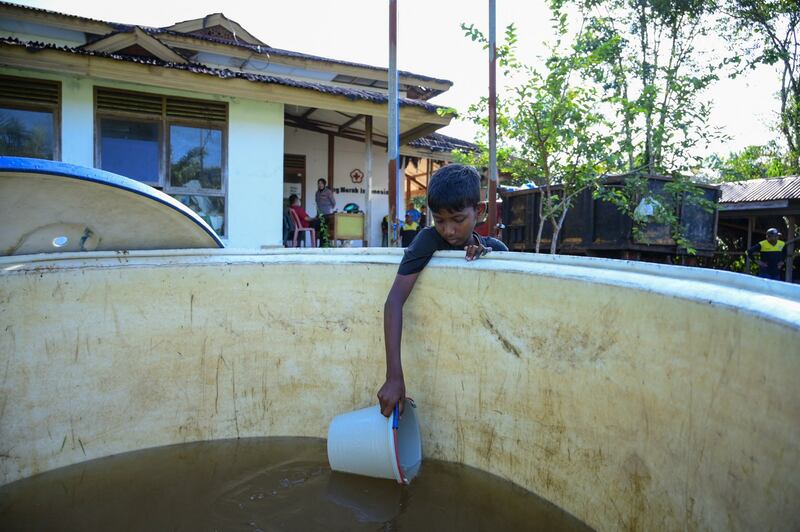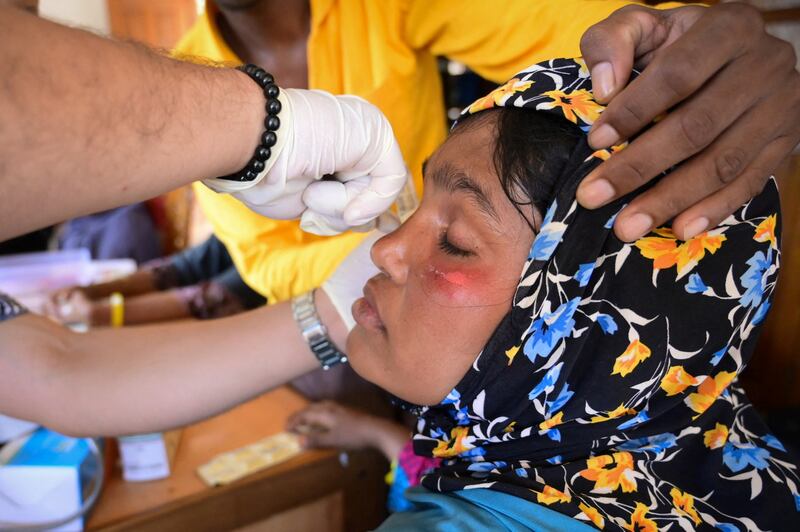For the second time in three months, a belligerent and resentful crowd of locals in Indonesia's Aceh province made authorities move dozens of newly arrived Rohingya refugees from their shelter by storming the facility, officials said Wednesday.
After their boat had capsized near West Aceh regency last week, following a long journey from Bangladesh, the 75 traumatized Rohingya were placed in the temporary shelter in the village of Suak Nie. They seemed scared and sobbed, as seen in a widely circulated video, before officials led them to a vehicle to relocate them.
Villagers from Suak Nie said they were protesting because the local government had not moved the Rohingya away after five days as promised, said Mawardi, the West Aceh Regional Police spokesperson.
A human rights group official said fake news and misinformation starting around October had fueled locals' resentment against the Rohingya, who are a persecuted Muslim minority from Myanmar.
“People held a demonstration because they received information from the local government that the Rohingya would only be sheltered for five days, but [their stay] had already exceeded that limit,” Mawardi, who goes by a single name, told BenarNews.
The temporary move was for the refugees’ safety, said Muhammad Hidayat Isa, communications head for West Aceh regency.
“The refugees have been moved to the backyard of the West Aceh regent’s office complex to avoid unnecessary unrest,” Hidayat told BenarNews.
An official from the United Nations refugee agency, UNHCR, also confirmed the incident that took place in West Aceh and the events in the video, which were shared widely on social media.
“Yes, the expulsion [from the temporary shelter] really happened as circulated on social media,” Faisal Rahman, a protection associate at UNHCR, told BenarNews.
On the run
The stateless Rohingya have been fleeing violence and oppression in their homeland in Myanmar for years.
Following a 2017 military offensive in Myanmar’s Rakhine state that the U.N. described as a “textbook example of ethnic cleansing,” about 740,000 Rohingya fled across the border to Bangladesh.
Usually, many Rohingya refugees who end up in Indonesia have left the Cox’s Bazar camps in southwestern Bangladesh seeking a better life in Muslim-majority countries in Southeast Asia.
Aceh, at the westernmost tip of Sumatra island, is a semi-autonomous and religiously conservative province.

The 75 refugees rescued from the sea last week had been housed in an Indonesian Red Cross (PMI) building in Suak Nie, which lies in Johan Pahlawan district, Faisal said.
According to Ali, a resident of the village and a participant in Tuesday’s actions, UNHCR and the local government had made no efforts to move the Rohingya despite promising the villagers they would be there for only five days.
More than five days had passed, Ali, who wanted to be identified by only one name for security reasons, told state news agency Antara.
“Want [them] to be moved to the regent’s hall or regent’s office, please; the important thing is that there are no more Rohingya refugees in our village,” Antara quoted Ali as saying on Tuesday.
This latest batch of refugees had arrived from refugee camps in Bangladesh in a wooden boat that capsized at sea near Meulaboh city, in West Aceh regency, on March 20.
On that day, rescue officials could only bring ashore six passengers, but the next day the search team rescued 69 additional Rohingya who had been clinging to their wooden boat.
Survivors claimed the boat was carrying around 150 passengers, with UNHCR officials saying they feared more than 70 Rohingya may be missing or dead. Over the weekend and on Monday, the bodies of 11 Rohingya were found at sea not far from where the boat overturned.
Growing number of refugee boats
This incident occurred amid the increasing arrival of Rohingya refugee boats in Indonesia, starting last October.
In 2023 alone, more than 2,300 Rohingya refugees had arrived in Indonesia, according to the UNHCR and the International Organization for Migration.
They have been accommodated in locations across Aceh, UNHCR said.

Azharul Husna, a coordinator at of the Commission for Missing Persons and Victims of Violence (KontraS Aceh), condemned the actions of residents forcibly evicting Rohingya refugees.
She said the latest incident and a similar one in January resulted from a steady and deliberate spread of false information about the Rohingya on social media – such as they were living a tad too comfortably in refugee camps, were becoming colonizers, and were involved in sexually harassing locals.
“This has created a stigma against Rohingya refugees,” Husna told BenarNews.
“As a society that has gone through the experience of the longest war, the biggest tsunami disaster and enjoyed the abundant love of the world’s citizens, aren’t we the ones who understand and can best feel the pain of the Rohingya people?”
Nurdin Hasan in Banda Aceh, Indonesia, contributed to this article.
BenarNews is an online news outlet affiliated to Radio Free Asia.
